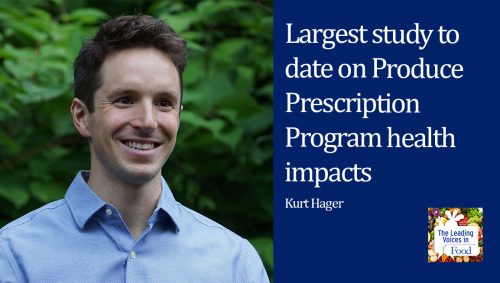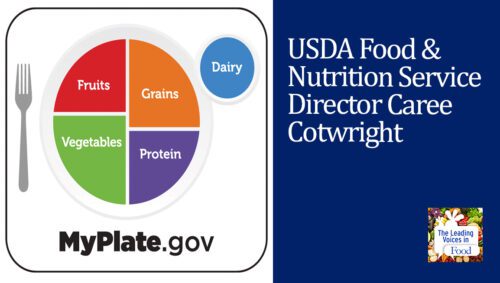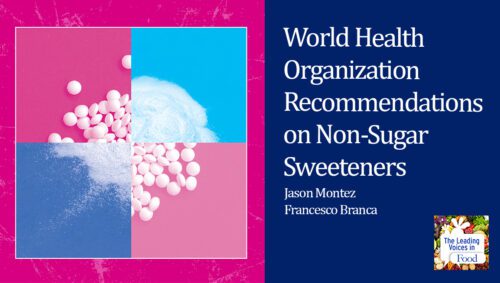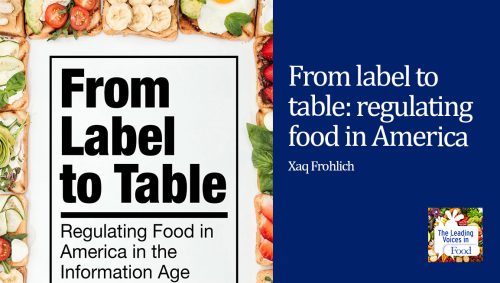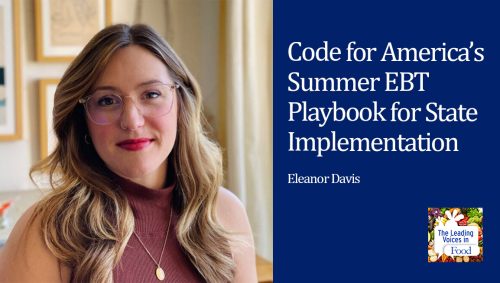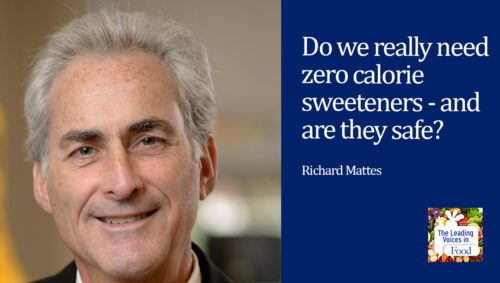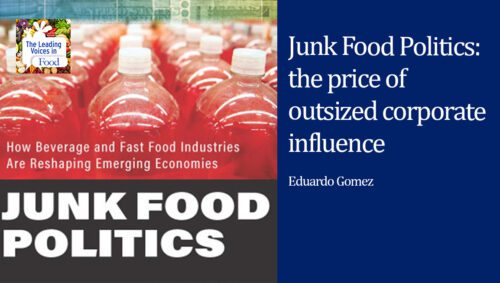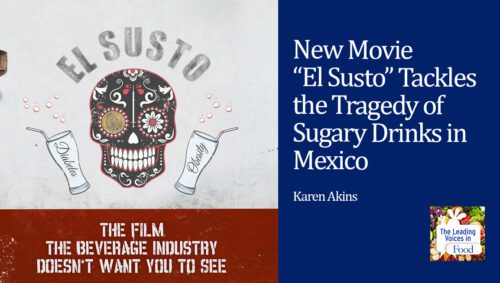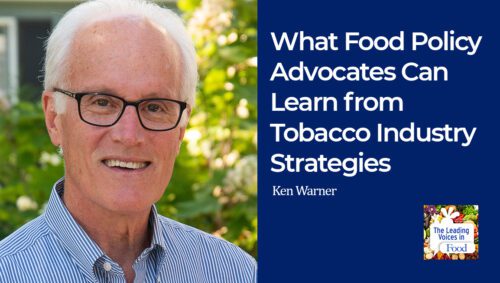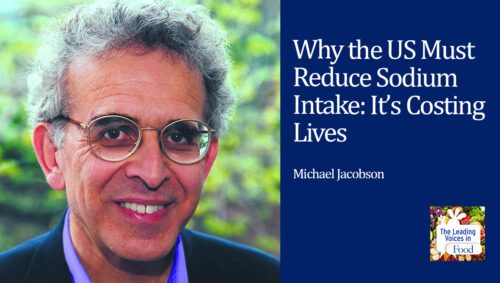The Leading Voices in Food
E51: Neena Prasad on the Sound Benefits of Soda Taxes
Imagine you’ve come to work for a major foundation and were asked to create a program on obesity prevention. With the vast array of possible things one might do, how in the world would you choose what might have the most impact, and what would be the most cost effective? This was the task of our guest Dr Neena Prasad, who joined Bloomberg Philanthropies in 2008.
Subscribe: Apple Podcasts | TuneIN | Google Podcasts | SoundCloud | PocketCasts | Radio Public
Tags: Childhood Obesity | Food Policy | Obesity | Soda Taxes | Ultra-processed Food & Additives |

Neena Prasad is a primary care physician who also holds a master’s degree in public health. She joined Bloomberg Philanthropies in 2008, and led the development of the program she directs, The Foundations Obesity Prevention Program. This program aims to improve the food environment through policy change. In addition, Neena directs the maternal and reproductive health program and tobacco control efforts in India. Neena and her colleagues at Bloomberg have played the leading role in supporting and evaluating soda taxes around the world. Neena, thanks so much for joining us. So let me begin by asking why Bloomberg Philanthropies decided to do invest in this work on soda taxes after there’d been such a strong history of work on tobacco.
Interview Summary
Imagine you’ve come to work for a major foundation and were asked to create a program on obesity prevention. With the vast array of possible things one might do, how in the world would you choose what might have the most impact, and what would be the most cost effective? This was the task of our guest Dr Neena Prasad, who joined Bloomberg Philanthropies in 2008. I’m Kelly Brownell, Director of The World Food Policy Center at Duke University and professor of Public Policy at Duke. Welcome to The Leading Voices in Food.
Neena Prasad is a primary care physician who also holds a master’s degree in public health. She joined Bloomberg Philanthropies in 2008, and led the development of the program she directs, The Foundations Obesity Prevention Program. This program aims to improve the food environment through policy change. In addition, Neena directs the maternal and reproductive health program and tobacco control efforts in India. Neena and her colleagues at Bloomberg have played the leading role in supporting and evaluating soda taxes around the world. Neena, thanks so much for joining us. So let me begin by asking why Bloomberg Philanthropies decided to do invest in this work on soda taxes after there’d been such a strong history of work on tobacco.
It’s great to be here with you today, Kelly. Thanks for inviting me. If I had to describe the investment approach of Bloomberg Philanthropies in a sentence, I would say that we aim to address large unmet needs in public health globally and particularly in low and middle income countries. And what do I mean by unmet needs? I mean things that are major killers and that are underfunded, and obesity fits that bill. And when we started to look at this issue seriously back in 2011, the numbers were quite staggering.
And fast forward to today, obesity is a major cause of death and disability globally. Today, over 4.7 million people die from a high body mass index. And what’s astounding is how quickly it has jumped to be one of the leading risk factors for death. So in the span of a little over 25 years, it’s gone from being the 16th highest risk factor for death to the fourth. And pretty much every country is affected and no country has successfully reversed it.
The health consequences are well-documented, I don’t need to get into that here. But the other thing we’ve got to be mindful of are the economic impacts. And a recent estimate by The World Obesity Federation put just the treatment costs for obesity-related diseases at 1.2 trillion US dollars by 2025, that’s just treatment. And so what this means is that is really a development issue, and it wasn’t getting much attention. And we felt a sense of urgency. This felt like a ticking time bomb that could really undermine development in low and middle income countries, and we really felt the need to act.
And Kelly, you mentioned tobacco control. This program, I think, as we’ve come to work on it now for a few years, have come to realize there are a lot of parallels, actually, with tobacco, both on the policy side, which we can get into later, and also interestingly, in terms of how the industry behaves. It seems that the food and beverage industry uses a lot of the same tactics that we’ve seen the tobacco industry used. And so in some ways, our experience in tobacco, though it’s not a perfect parallel, has prepared us for working in obesity prevention.
So Neena, let me ask this, you made a very compelling case for why obesity should be addressed and how there’s so much unmet need. Why take on soda tax as the primary effort?
So I should say that our program is actually much bigger than soda taxes, though I think it’s fair to say that that is the one policy with a pretty solid evidence-base and as a result should be adopted by all governments. But soda taxes are not a panacea, and addressing obesity will require a slew of demand and supply side interventions. And so we are really focused on a package of interventions, much like we have in tobacco control. In tobacco, there’s a WHO packaged called MPOWER, which are proven policies that every country should be adopting. Things like raising the price of tobacco so that it’s less affordable, banning the advertising of tobacco, placing graphic warning labels on tobacco packages.
And what we’re trying to do in the obesity space is generate evidence to get us to an MPOWER like package for obesity. And often, you’ll hear people say that obesity prevention is 30, 40 years behind tobacco in terms of the evidence base. And we know, for the reasons we just discussed, that we can’t afford to wait. And so we’re really trying to accelerate the adoption of an evidence base and provide that guidance to governments.
And the package that we are working on was based on a lot of expert opinion, including yourself, Kelly. And basically, based on all this input, we landed on four policies that looked promising. And they are taxes on sugary drinks, we’ve now brought in that to also include unhealthy foods. The second priority for us is front of package warning labels. The third is restricting the kinds of advertising, promotion and sponsorship that children are exposed to, and the fourth is improving the public sector food space, particularly schools.
And our approach, really, is twofold. The first is we work in a few focus countries, where we support both policy advocacy and evaluation once policies are in place. And then we also have an evaluation fund which supports evaluation in our non-focus countries, which I can talk a little bit more about later. But basically, we’ve identified the best advocates and the best researchers in our focus countries who are really driving this agenda and working to raise awareness and get these policies adopted.
With your permission, I’ll invite you at a later time to come back and join us and talk about some of the non-tax related approaches you’re taking, because I know those are very exciting and have been taking shape in lots of interesting ways in different countries. But returning to the soda tax approach, how have you chosen to approach that work, and what are you choosing to do in the countries? You mentioned choosing the best advocates and the best scholars to work with. What else are you doing to try to make these soda taxes work in different countries?
Every country is different, and so the approach is going to be different in different countries. But one thing that I think is universal, whether you’re in the US or in Mexico or in South Africa, and that is you’ve got to build public awareness. The public needs to understand the unique harm of these products and therefore understand why they’re being taxed. We differ very much to our partners, they know their country context and they know what’s going to resonate and what’s not.
But a big component of our investment is just evidence-based communications campaigns for the public to understand that when you have a soda, this is how many teaspoons of sugar you are consuming. So that often softens the ground for something like a sugary beverage tax down the road. I don’t think anywhere you can come in and say, “We’re going to raise taxes.” You’ve got to inform people, you’ve got to build up public opinion. And in fact, we found pretty much everywhere where we work, that if you take the time to educate people, by and large, they all support this policy and they feel that government has a responsibility to protect their health.
Other ways that we support this, so we support a lot of research to make the policy case. So, for example, in Mexico before the tax was adopted, partners there did a lot of work around the economic impact of overweight and obesity and related diseases in Mexico and contrasted that with the savings from something like a tax, not to mention the revenue that’s generated that could then be put back into public health programs. So it’s really a combination of research and advocacy, or maybe put differently, it’s research-driven advocacy.
Neena, you mentioned the importance of going in and softening the ground by doing public awareness campaigns, is there any evidence that those campaigns themselves, irrespective of whether the tax the gets passed, have an impact on consumption of these beverages?
That’s a really interesting question, and it’s a question that we are… and all of our partners are asking ourselves and trying to tease apart from the evaluation of these taxes. So, what is a price effect versus what is just people’s growing awareness? And I don’t have a scientific answer for you there yet. I hope sometime down the road we will have that. My sense is, though, that communications campaigns do have an impact. Certainly, in the post campaign evaluations we do, we detect that people are thinking twice about what they’re consuming. So I do suspect that it’s playing some role, but I couldn’t quantify it for you quite yet.
Thank you for that. Can you paint a picture of how widespread these taxes are around the world? And are there countries that are kind of in the mix but haven’t quite passed taxes yet? Where does the picture stand if you look at the whole world?
So, by our count, about 50 countries in the world have some sort of sugary beverage tax. Now, that says nothing about the rate or what products are covered. We started doing some pilot work in Mexico back in 2013, and our partners there felt the time was right to work on a sugary beverage tax. There was a new government in place, they were looking for revenue. That’s what they wanted to work on. So, we supported them to do that. And long story short, they were really successful, and they got this tax passed, which was then implemented in 2014.
We have been supporting evaluation of that tax. And if you look at the first two years of that tax, there was a 10% reduction in consumption of sugary drinks. And this was a relatively smaller tax, it was about 10%, one peso per liter or 10% at the time. And the feeling is that taxes should be at least 20%. But even with a small tax, they saw an impact. And I think having that data published, having these really rigorous studies done and published in peer review journals was a game changer. It was, in my knowledge, the first time this kind of empiric national level data had been published.
And what we’ve actually found is that since Mexico implemented and these evaluations were published, 30 countries have followed, covering 2 billion people. I think that this anecdote really illustrates the role of a funder like Bloomberg. We can support leading partners who are innovating and testing out policies and study them really carefully and if proven effective, make the case to government as to what is a smart policy and what isn’t. So that’s just a general kind of sense of the acceleration that we’ve seen post Mexico.
I think in the US, it’s been a little slower going in. It’s been more the city level. We’d love to see some states come on and tax sugary drinks. But, you know, I have to say we’re optimistic. The evidence is there, and it’s more a matter of when, not if, we think, when most governments will see this as a smart policy and start implementing it.
Neena, you partially answered a question that I was about to ask, and that’s, what special role does the foundation possibly play in this process? And you mentioned the opportunity, the fund rigorous research to evaluate the impact of such taxes. Is there also a unique role in say the advocacy part of things that a foundation like Bloomberg can play?
Absolutely. I think it goes without saying that at the end of the day, governments have a responsibility to protect public health. And we as private foundations can never ever replace the role of government. But we can support the adoption of things more quickly. And this is, quite frankly, an area where we see a lot of industry interference. So this is a topic where we see tremendous pushback from the food and beverage industry. They do not want to be regulated. And the food and beverage industry has a lot of influence, they have a lot of resources, so advocacy to counter that is critical.
And I do think that we at Bloomberg have been able to bring our experience in policy advocacy from other tough issues like tobacco control to this space to encourage more of a level playing field. I don’t know that we can ever match the industry, but we do feel like we can level that playing field and bring a real, genuine and data-driven public health perspective to the conversation. So, yeah, absolutely. I do think that’s a role that we can and have played.
So the opposition by the industry is obviously an important challenge to accomplishing what you are hoping to accomplish. Are there some other things that you’d list as challenges?
I think one thing that I would describe as both exciting and a challenge is there is no playbook here. We are trying to figure out what works. And our partners are… This is uncharted territory in many ways, and our partners are writing that playbook. And yes, that’s exciting, to be kind of at the forefront of something. But it also means there’s some risk and there’s potential for errors or mistakes, or there could be unanticipated consequences. And we just don’t know until you get these policies adopted and study them.
So I think that’s a big challenge. I feel really assured that we are working with, as I mentioned, the best advocates and researchers in the space who were incredibly data-driven and experienced and extremely thoughtful. So I hope we minimize that error or that potential for some unanticipated consequences, but it’s inevitable. That’s just the nature of kind of being out there and doing something first. Another challenge is a lot of the countries where we work, South Africa and Columbia come to mind, there, while rates of overweight and obesity are quickly growing, they’re also facing large burdens of undernutrition.
And I think we, generally, need to be better about bridging that divide. It seems to me there’s been a bit of a divide between the undernutrition and the over-nutrition communities. But ultimately, we’re all after the same thing, and that is to produce environments where people have access to whole, healthy, affordable foods. So that’s been a bit of a challenge, and one we’re thinking especially hard about, is how do we broaden the coalition of actors, because we really are after the same objective.
Well, Neena, one final question. And I’m curious about your impressions on what the future will bring with such taxes. Would it be higher taxes in existing countries, more countries? You mentioned earlier the possibility of taxing more than just sugared beverages. Where do you think this work might go in the future?
I do think more countries are going to take this on. You’re probably familiar, Kelly, with the tax in the UK, which is based on the quantity of sugar, and I do think that’s the way to go over a volume-based tax. If you’re taxing on quantity of sugar, that means more sugary drinks will be more expensive, so a consumer would be incentivized to buy something that’s cheaper and therefore less sugary, and that’s a form of harm reduction. So I do think that’s kind of the next frontier in terms of tax design, and I believe there are some studies going on in the UK and we’re really looking forward to seeing what the impact is there.
And the other piece in the UK that was really illustrative was even before the tax came into effect, the industry undertook massive reformulation to get their sugar out of their products so that they would be subject to little or no tax. So it’s interesting to see what’s happening in the UK, and I think that countries, assuming they have the administrative capacity, really need to be looking at these sugar-based taxes. I think a couple of other unanswered questions are, what products should be taxed? And some cities in the US tax artificially sweetened drinks and forthcoming evaluations will tell us more about that. So I think there’s a big question mark there.
And similarly, should we be taxing things like fruit juice? I don’t think we want to be sending the message that it’s okay to substitute your soda with orange juice, because that’s pretty sugar-laden as well. So I think these are some places where there’s opportunity for governments to push. And then of course, I think the rates need to be much higher, at least 20% if not higher.
Well, Neena, thank you so much for joining us. You and your colleagues have just done remarkable work, and the impacts of this work are being seen in country after country around the world. So, I really appreciate you being our guest today. Thank you again.
Thank you, Kelly. It’s been great chatting.
Our guest has been Doctor Neena Prasad, Director of Bloomberg Philanthropies Obesity Prevention Program. And thank you for listening. If you’d like to subscribe to The Leading Voices in Food series, you may do so at Google Play, Stitcher, RadioPublic or Apple Podcast, or by visiting our website at The Duke World Food Policy Center. This is Kelly Brownell.

